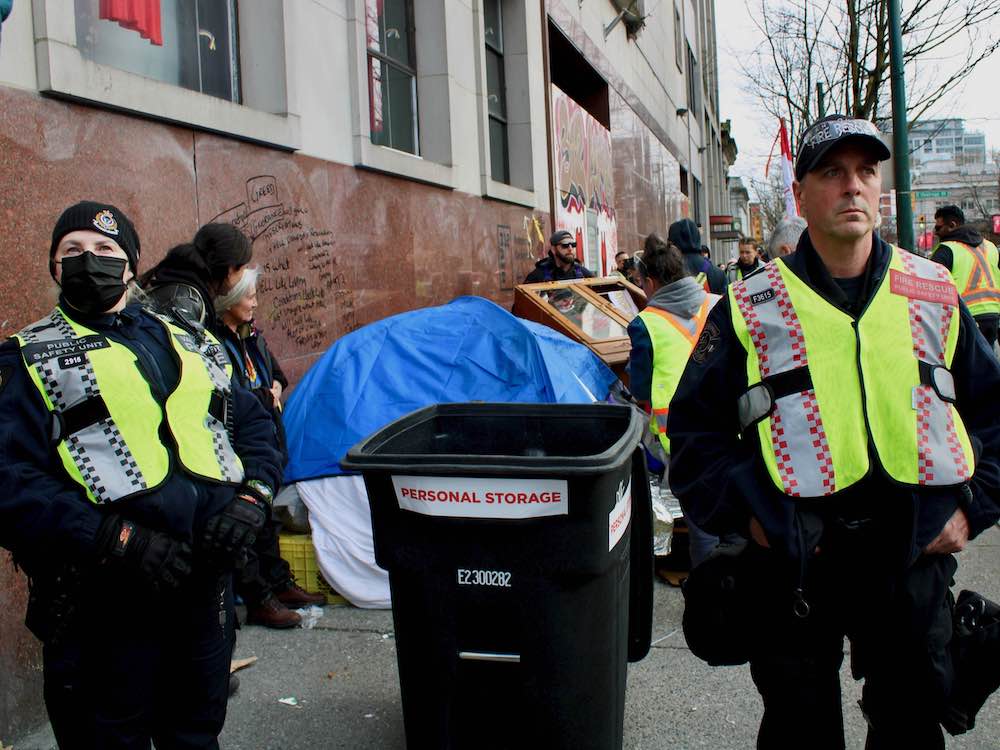The City of Vancouver and Vancouver Police Department spent a total of $548,000 to clear a homeless encampment on East Hastings Street in April — money critics say could have been spent on providing badly needed services for the city’s growing number of unhoused people.
“You think of how many shelter beds could they have opened for that,” said Jean Swanson, a former city councillor who advocates for homeless people as a member of the Carnegie Housing Project.
The Carnegie Housing Project recently released a list of nine recommendations it said were urgently needed as winter approaches, from increasing the number of shelter spots to opening more daytime drop-in spaces.
The number of unhoused people in Vancouver shot up by 16 per cent between 2020 and 2023, meaning there are now 2,420 homeless people in the city, according to the most recent homeless count.
Across Metro Vancouver, homelessness grew by 32 per cent, with a total of 4,821 unhoused people counted. The voluntary point-in-time survey, which was conducted in March, is acknowledged to be an undercount of the actual number of homeless people.
The Hastings clearing operation was the most aggressive decampment that has taken place in the city in recent years. It was a departure from the city’s usual strategy of working with BC Housing and non-profit housing operators to secure housing and shelter spots before removing a camp.
Several shelter operators said they were caught off guard by the city's action and did not have enough spots to meet demand after people's tents were taken from them.
On April 5, dozens of police officers and city workers cleared seven tonnes of tents and other belongings from a camp that had formed on Hastings Street between Carrall and Main. More than 90 tents were removed.
The city said it had no other choice because of the number of fires, violent incidents and sexual assaults happening in the sidewalk encampment.
But homeless people and shelter operators said there were not enough spaces for people to go to and the tent removal left some people without any shelter at all.
The Tyee asked for the total cost of decampment activities from April 5 to 12.
Figures released through freedom of information requests to the city and Vancouver Police Department show that police salaries and benefits took up $409,536 of the decampment cost.
The City of Vancouver’s total was $107,803 for labour, $21,572 for city equipment and leased equipment like trucks, $934 to hold tents at an impound lot and $7,875 to provide wheeled plastic garbage bins to homeless people to help store their belongings.
People are still being ordered to remove tents off of Hastings and the street is being regularly cleaned. But Vancouver’s homeless problem is far from being solved.
At a press conference last week, members of the Carnegie Housing Project and Downtown Eastside community organizations warned that they’re seeing more desperation and poor health in the vulnerable Downtown Eastside neighbourhood.
Trey Helten, manager of the Overdose Prevention Society at Hastings and Columbia, said that during the winter months people crowd into the small storefront space and even try to hide under the tables, making it difficult to spot overdoses.
Gary Davison, a community liaison with Heart Tattoo Society, called for more medical outreach teams.
A tranquillizer called xylazine is increasingly being added to the synthetic opioid fentanyl, and xylazine injections are leading to persistent infections and abscesses in people’s limbs that are very hard to heal, especially when people are unhoused, Davison said.
The City of Vancouver is preparing to open 67 temporary winter shelter beds, 70 extreme weather response spots and 236 warming centre spaces this winter, in addition to the city’s 1,400 permanent shelter spaces.
The Carnegie Housing Project is calling for an increase in shelter spots to actually meet the number of people who are homeless.
The group also wants the city to:
- extend the leases of 144 units of modular housing that are set to close soon;
- create a tiny-home village to house people living in the CRAB Park encampment;
- open more daytime “hangout” spaces where people can go during the day;
- increase medical outreach services in the Downtown Eastside; and
- increase laundry and shower services.
The Carnegie Housing Project is also asking for changes to B.C.’s rent laws to require landlords to get approval from the Residential Tenancy Branch and have a homelessness prevention plan before evicting people from supportive housing and single-room occupancy hotels. ![]()
Read more: Rights + Justice, Housing, Municipal Politics

















Tyee Commenting Guidelines
Comments that violate guidelines risk being deleted, and violations may result in a temporary or permanent user ban. Maintain the spirit of good conversation to stay in the discussion and be patient with moderators. Comments are reviewed regularly but not in real time.
Do:
Do not: